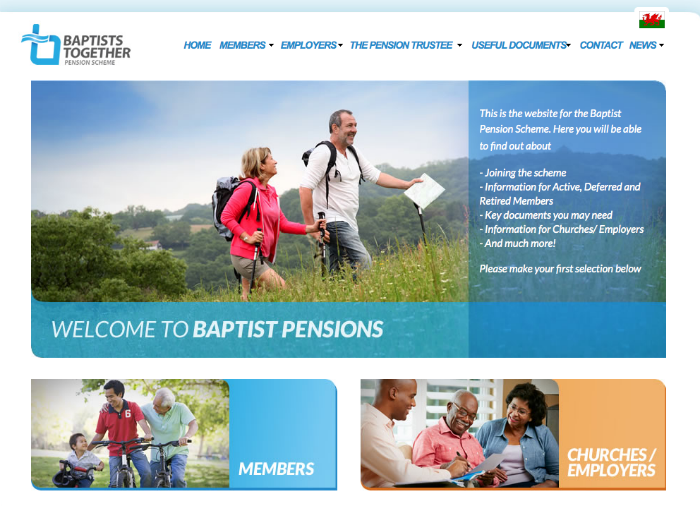The Baptist Pension Scheme
Questions and answer session with Chris Maggs, Moderator of the Trustee Board for the Baptist Pension Scheme

Who are the trustees of the Scheme?
The Trustee Board is a mix of members of the Scheme (both active and retired ministers) and people with financial or management backgrounds from the Baptist Family. Apart from me, these are unpaid, voluntary roles. We have four meetings a year plus additional commitments on various sub-groups that go into more detail in areas like investments and governance. The primary role of the Trustee body is to fulfil the promises made by the churches and other participating employers through the Pension Scheme to the ministers of the Baptist Family.
How do the trustees make decisions?
We have professional advisers in all areas who give a clear lead on legal and financial matters. This includes specialist investment consultants, actuaries and legal advice. Pensions law is complex and we are also required to act in full compliance with the Trust Deed under which the Pension Scheme was set up and the benefits defined. As a Trustee Board we have to have a certain level of knowledge and understanding but we rely heavily on the expertise of our professional advisers.
Do the trustees actually run the Scheme?
No, the Trustee Board only has an oversight role. We have a Pensions Manager, Mark Hynes, who works full time on the Scheme and he has two supporters who liaise with churches and other employers. The actual administration of the Scheme in day-to-day terms is delegated to the professional pensions firm, Broadstone Consultants and Actuaries Ltd**.
 How do you approach the trustee role?
How do you approach the trustee role?
I see my task as a calling. A career in pensions has equipped me with talents that fit this role so I try to apply myself as a faithful servant for God and for the church. I also take note of the three things that Micah 6:8 tells us God requires:
To act justly – in this context I see this as meaning doing what is right under pensions and trust law, which is not always as easy and helpful as it should be.
To love mercy – there are areas where, as a Trustee body, we have to use our discretion and judgement. In these aspects we should have a spirit of care and compassion for both the members of the Scheme and the churches/employers.
To walk humbly – our position as trustees is one of service, not of status. We should listen to all the concerns we hear and not think we have all the answers.Of course, as in all areas of life, these three things sometimes pull us in different directions. We have to find the right balance.
Why is there a deficit in the Scheme? Who is to blame?
It was very helpful for me to be part of the team who presented the pensions roadshow around most of the Baptist Associations. Although this did not reach all the participating employers, it gave many the opportunity to find out more about the reasons for the deficit and to discuss the various things that might be done. It also allowed me to have some first-hand discussions with churches that have been shocked and hurt by the size of pension debts that have come their way. More generally, I appreciate that there is still some confusion and frustration over why such a large hole exists in the Scheme. More than once it has been suggested to me that it is down to mismanagement by the Baptist Union and/or the Scheme Trustee.
As a pensions actuary who has been working in the industry for over twenty-five years I can assure you that the experience of the Baptist Pension Scheme is consistent with that of ‘defined benefit’ or ‘final salary’ pension schemes throughout the UK. All have been caught out by seismic shifts in the economy over a prolonged period. Most of us are familiar with the low Bank of England base rate because it gets reported on regularly in the news but this is just the tip of an economic iceberg affecting all aspects of finance. Pension schemes are particularly sensitive to long-term investment return expectations in the financial markets and these have continued to reduce year-on-year as people adjust to a low interest, low inflation environment.
Big commercial companies have responded to the shortfalls in their pension schemes by making massive contributions out of profits. The Baptist family does not have that option. Instead, our recovery plan is steady regular contributions over a long period. The recovery plan from the latest valuation runs to 2035.
What can we do about the deficit?
There are things that can be done, and we talked about these in the roadshows. Some of them are in the hands of the Trustee body and others are in the hands of the employers, so a joint approach to solving a Baptist Family problem is needed. We need to work together.
How do you know what the churches/employers want to do?
This is a big question with so many churches and other employers involved in the Scheme. The Baptist Union has tried to be a central point to co-ordinate the views of employers and it has recently established a Pensions Employer Group to facilitate that task more specifically. I look forward to working with the Employers' Group over the coming months and years. Inevitably the employers will have different priorities to the Trustee is some areas but we have a common goal and a desire to work together.
Why do some churches have a debt to pay and others do not?
Although there is a shortfall in the Scheme, it only becomes a specific debt on a particular employer if that employer is deemed to have left the Scheme. That can happen in three ways:
If it chooses to leave
If it stops being a formal body (e.g. it goes bankrupt or disbands)
If it ceases to have an employee who is a member of the Scheme
Most debts arise in the Baptist Pension Scheme because of the third scenario. A church with a single minister, for example, triggers a debt when that minister leaves. The Trustee has agreed to various ways in which a church/employer can avoid an immediate debt in these circumstances but these have to operate under strict legal rules, which is why it is vital that any church or employer in this situation makes contact with the Scheme administrators, Broadstone Consultants and Actuaries Ltd, as early as possible.
The amount of a particular church/employer’s debt depends on the ministers or other staff they have had in the Scheme. Factors such as age, length of service, salary level and whether they paid additional contributions can make a big difference.
If a church/employer does not trigger a debt then it is simply one of the many employers who are collectively funding the Scheme and contributing to the recovery plan.
Where can I get more information?
The Baptist Pension Scheme website is a good source of information: baptistpensions.org.uk
Should you have specific questions that are not answered there then for matters relating to the general administration of the scheme, please contact the Scheme Administrators, Broadstone Consultants and Actuaries, at
Broadstone Consultants & Actuaries Ltd
Canard Court
23-25 St George’s Road
Bristol
BS1 5UU
Tel: 0117 937 8700 or send an email.
A profile of Chris was featured in the Spring 2016 edition of Baptists Together magazine
** this article has been amended to reflect that the administration of the Scheme has been delegated to Broadstone Consultants and Actuaries Ltd since the interview.
Baptists Together, 07/01/2016